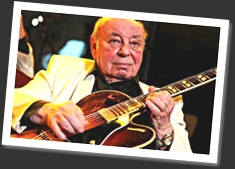Events in Europe marking the 77th anniversary of Kristallnacht were as bad as they were bizarre.
- Hanin Zoabi, the extremist Arab Knesset member, used a memorial meeting in The Netherlands to compare Israel to the Nazis.
- Jews were excluded from a similar event in Umea, Sweden due to a supposed "security risk".
- On the eve of the anniversary, Monday 09 November, an anti-Israel Boycott, Divestment and Sanctions event was hosted at a city-funded building in Munich.
And so on, ad infinitum …
 But none of this would surprise jazz musician Heinz ‘Coco’ Schumann, a Berlin-born Jewish concentration camp survivor who remained in Germany post-war – but who ensured he always had a suitcase packed - ready to flee at a moment’s notice.
But none of this would surprise jazz musician Heinz ‘Coco’ Schumann, a Berlin-born Jewish concentration camp survivor who remained in Germany post-war – but who ensured he always had a suitcase packed - ready to flee at a moment’s notice.
So much emerges from his unsettling memoir, The Ghetto Swinger which is littered with examples of modern German Jew-hatred and Holocaust denial even to the very end.
Schumann, who was born to a Jewish mother and an Aryan father and went on to be an internationally renowned guitarist and drummer, was among musicians who were forced to provide entertainment in the camps.
One of his worst experiences was performing the Cuban dance melody La Paloma by the side of the ramp down which droves of fellow Auschwitz-Birkenau inmates were herded to their deaths.
But Schumann is an optimist who in the manner of Roberto Benigni’s film, Life Is Beautiful, made the best of grotesque situations, first in Theresienstadt - “one giant illusion of internal and external propaganda”, then at Auschwitz-Birkenau where he began thinking deeply about being Jewish: “ … now”, he writes, “I embraced my heritage in a very special manner!”
Self-evidently, his musical ability not only saved his life but helped him to keep his sanity: “I am a musician who spent time in concentration camps, not someone in a concentration camp who also played a little music”, he insists.
Then after the war, when he tramped the rubble-strewn streets of Berlin he decided “… out of respect for all the people I had seen die in the concentration camps .... to embrace my Jewish faith without properly knowing its teachings”.
But like many artistes – especially those with broken pasts - Schumann has spent his life on the edge of society, trying to escape his history and never feeling ‘at home’ anywhere, unless he is on stage.
The emergence of post-war German nationalism made him and his wife Gertraude feel particular disquiet and they considered emigrating. First they thought of Israel – but felt that Schumann’s ties to Judaism were not that close and that anyway, the Middle East situation was too risky. Then they considered the United States, but were denied visas because his mother had joined the Socialist Unity Party of Communist East Germany. So they opted for Australia, where they stayed for several years. But they returned to Germany as their move finally proved unconducive.
Schumann has forever harboured the guilt felt by many camp survivors and suppressed his story for about fifty years until he was persuaded to reveal it for a documentary film. He was afraid that by telling it he would no longer be ‘German’; not a musician, not a friend; just a victim. He says: “I had to find a way to talk about my life, just like I found a way to play La Paloma again”.
Superficially, Schumann’s experience was perhaps less harrowing than that of many others. He wasn’t physically tortured and as a musician he had some minor privileges denied to other camp inmates. Then after liberation he was, quite remarkably, reunited with his parents, infant brother and various close friends.
Yet some unnamed unease haunts his story – and makes the reader share his discomfort. What is it? I must conclude that it’s because the Nazis and their ilk will be forever prisoners of themselves. Great art may not redeem them. Nothing will.
 The Ghetto Swinger: A Berlin Jazz-Legend Remembers, which first appeared in German in 1997 has been translated into English and will be published by Doppelhouse Press in January 2016 @ US $24.95 (£16.50; NIS 98.00 approx).
The Ghetto Swinger: A Berlin Jazz-Legend Remembers, which first appeared in German in 1997 has been translated into English and will be published by Doppelhouse Press in January 2016 @ US $24.95 (£16.50; NIS 98.00 approx).
© Natalie Wood (12 November 2015)
No comments:
Post a Comment